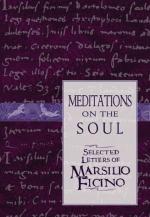|
This section contains 625 words (approx. 3 pages at 300 words per page) |

|
FICINO, MARSILIO (1433–1499), was the most eminent philosopher of the Renaissance. Ficino employed Neoplatonism, the characteristic form of Renaissance philosophy, as a support for Christianity. Cosimo de' Medici, impressed with Ficino's precosity, gave him the opportunity to learn Greek and presented him with his country house at Florence, the Villa Careggi, where Ficino presided over his "Platonic academy."
Ficino edited the complete works of Plato, translated Plato's Dialogues, wrote a commentary on the Symposium, and edited and translated various works of Neoplatonists such as Plotinus (the Enneads), Proclus, Iamblichus, Porphyry, and Dionysius the Areopagite. He also translated from Greek to Latin various second- and third-century mystical and gnostic texts (Poimandres) ascribed to Hermes Trismegistos.
In 1473, after an extended period of melancholy, Ficino became a priest. His own best-known works are On the Christian Religion and Platonic Theology, the latter an elaborate statement of his Christianized Neoplatonic philosophy...
|
This section contains 625 words (approx. 3 pages at 300 words per page) |

|


